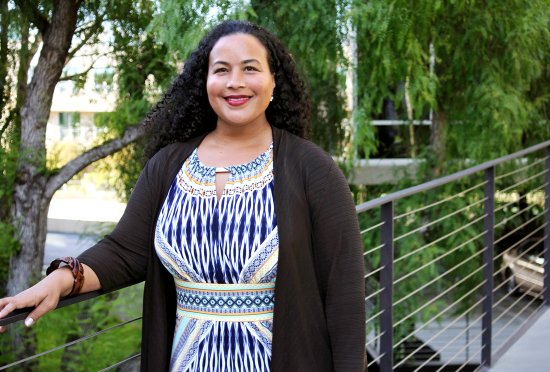
SVP Tiffany Smith-Anoa’i created a department to hire diverse talent at CBS
Tiffany Smith-Anoa’i spent two years pitching the higher-ups at CBS Entertainment a diversity and inclusion department and convincing them that she was the one to oversee it. Now she focuses on making sure that the network’s shows reflect the real world. Smith-Anoa’i, 46, spoke with Real Simple about bold proposals and sweet victories.
What were your dreams as a kid?
I was mesmerized by the sports broadcaster Jayne Kennedy. She was a woman of color who looked like me, and I didn’t see that often. I said, “That’s what I want to do.” I went to college for broadcast journalism and got an internship in a newsroom. But that made me realize that I didn’t want to be in front of the camera.
I wanted to be behind it.
[time-brightcove not-tgx=”true”]
What’s an important life lesson you learned early on? I had an academic scholarship to Howard University. All I had to do was maintain a 3.0 GPA, but I wasn’t taking things seriously enough. At the end of my first year, I had a 2.9 and lost my scholarship. I’ll never forget, my mother said to me, “You took someone’s spot.” It broke my heart, and I knew, from that moment on, I was never going to squander [an opportunity] again.
So what did you do? I enrolled in community college at home in Whittier, California, in 1989. My parents said, “If you want to go back to Howard, you pay for it.” I worked and was able to save $17,000. I went back and graduated with honors.
You worked for Nike for a while. Then what? I worked for Sinbad, the comedian, doing publicity. Then I got a publicity job at CBS.
You eventually pushed the network to create a new department. After I had been there for six years, I created a PowerPoint on why we needed a diversity and inclusion executive for entertainment. I went into my boss’s office one day and said, “This is where television is going, and this is the role we need.” I was nervous, but I felt so passionate about it that I wasn’t going to leave that office without being heard.
What made this so important to you? Every network around that time had a corporate diversity executive. But it wasn’t rooted in entertainment—the people responsible for casting, directing, writing, and developing shows. Most people hire people they know or people who look like them. I wanted to connect executives to a group of talent they might not normally come into contact with.
How did that go? It took two years. But I kept at it, and eventually I was able to present my PowerPoint to our then chairman, Nina Tassler. Two weeks later, I was promoted to vice president and was able to create the department.
How does the job play out? I introduce writers, directors, and young executives into this pipeline, and then it’s on the executives to hire them. I’m not the “diversity police.”
What type of leader are you? Before we start staff meetings, I’m always asking, “How are you doing?” and “How do you feel? Anything going on?” You never know what’s going on in someone’s life. Also, I empower my team to use their voices. When we meet, I don’t talk first—they talk first.
What is life outside work like for you? I have a daughter who’s 12. I’m really involved as a parent at her school. My husband is a professional wrestler, and he owns and operates his own wrestling academy in Los Angeles. He does live shows once a month, and my daughter and I work the concession stand. That’s part of our family tradition.
Thoughts on work-life balance? There is no balance. I refuse to feel guilty for it. I have a great support system at home with my husband. We are able to really divide and conquer.
What do you wish you could tell your younger self? Not to worry so damn much. I worried about what people thought. That’s such a waste of time. Another lesson I’ve learned as an adult is the value of the word no and how to really use it as a complete sentence.
Parting advice? Always reach for something you feel is unattainable, because that’s when victory is sweetest.